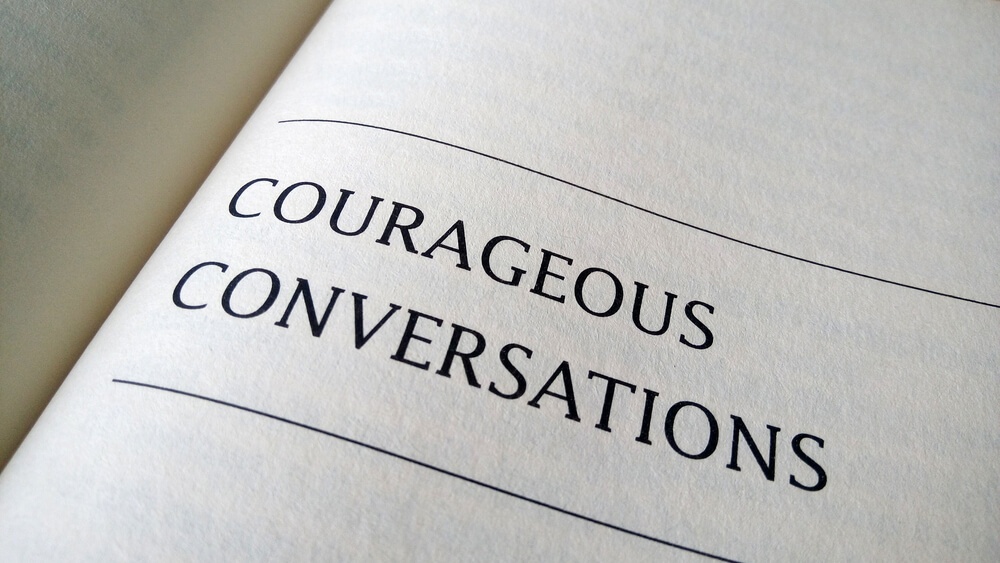Difficult conversations in the workplace are inevitable, whether it’s discussing a poor performance review or explaining a project delay to a client.
What’s the best way to approach these tense interactions?
Avoidance is always a possibility, but it’s only a temporary fix and it could potentially make the problem worse. Furthermore, avoiding uncomfortable conversations can actually have serious repercussions to the business as a whole.
New York Times bestselling author, Joseph Grenny of Crucial Conversations, advises “One of the most costly barriers to organizational performance is unresolved crucial conversations.”
This is why the best approach is to address the problem of difficult conversations head on. But how? What if you’re naturally uncomfortable with conflict or feel uncertain about what to say or do?
It all Starts with Planning
Challenging conversations are rarely successfully handled by winging it and hoping you get a positive outcome. Preparing in advance can help you overcome your fears and thus approach the situation with clarity and confidence.
If you’re struggling with how to handle an upcoming conversation that has the potential to be difficult, here are a few things you can do now to improve the desired outcome.
Ask yourself these two key questions:
1. What is the outcome I want to achieve?
According to Harvard Business Review, “the key in any tough talk is to always keep sight of the goal.” The key to success is to go into these conversations with a “clear, realistic preferred outcome; the knowledge of how you want your working relationship with your counterpart to be; and having done some careful thinking about any obstacles that could interfere with either.”
2. What am I afraid of?
One of the biggest barriers to approaching difficult conversations is fear. To overcome this, you must be honest about what’s holding you back. Is it fear of not being heard? Concern over the possibility of yelling or threats? Worry over the potential loss of a relationship?
Once you’ve figured out what’s causing your discomfort, begin addressing each concern before engaging in the conversation. For instance, if you’re afraid of a volatile situation, getting HR involved right from the start can help prevent such a scenario from occurring.
Map Out a Plan
Script out what you want to say to start the conversation. Briefly state the issue at hand, what your goal is and your desired outcome.
Be sure to devise a strategy to deal with the potential reactions that may occur. This includes how your counterpart might react as well as what you may feel based on those reactions.
Try to anticipate what the other party may say or do during the conversation and determine the best way to respond to each potential scenario.
Diane Ross, author of Elephant Conversations, suggests that to manage difficult conversations you need to “anticipate their reaction.” As an expert negotiator, she finds this “takes the sting out of reactions…prevents you from overreacting”.
More Secrets to Communication Success…
- Your body language can play a significant role in how a challenging conversation will ultimately pan out. Practice your ‘Power Poses’ to ensure you remain focused and confident during these challenging conversations.
- Realize your biggest strength is your ability to listen. Your goal should be to understand where the other party is coming from and what is fueling their behaviour. Remember – conversations are supposed to be two-way streets. Say what you need to say, then let the other party do the same.
- If the conversation goes sideways, instead of reacting, take a step back and ask the other party to reiterate or explain their point in greater detail. Saying something as simple as, “Tell me more about that,” can help flesh out the issue at hand and demonstrate that you really are interested in resolving the situation versus defending your position.
- During the conversation avoid ‘rabbit holes’. Stay centred and don’t allow yourself to get off track. To help you stay focused on your objective, write these potential ‘rabbit hole’ items on a piece of paper. If they arise, don’t respond. Instead, focus on the topic at hand and continue to listen.
Difficult conversations, though challenging for both parties involved, enable people to learn, grow and make better decisions. When handled correctly, they can result in positive, productive outcomes and even enable breakthroughs in relationships.
The tips above will empower you to enter even the most challenging interactions with poise, confidence, control and positivity.
Author: Joanne Loberg of JL Careers Inc. is a Certified Executive Coach and Internationally Certified Career Management Professional. She has a reputation as a highly sought after Career Consultant and she has been referred to as “an absolute expert at navigating the complex territory of career advancement.” Copyright JL Careers Inc. All rights reserved.
Wishing you much career success!
Joanne Loberg
Certified Executive Coach & Internationally Certified Career Management Professional
JL Careers Inc




